2011年12月英语四级真题及答案解析完整版
- 格式:docx
- 大小:55.92 KB
- 文档页数:42
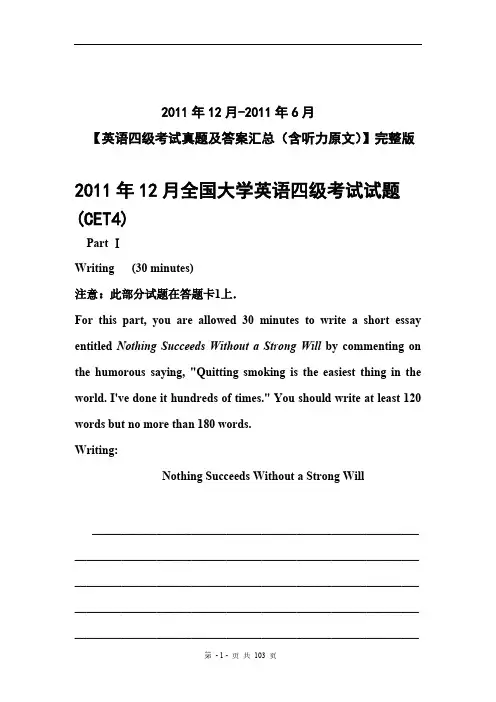
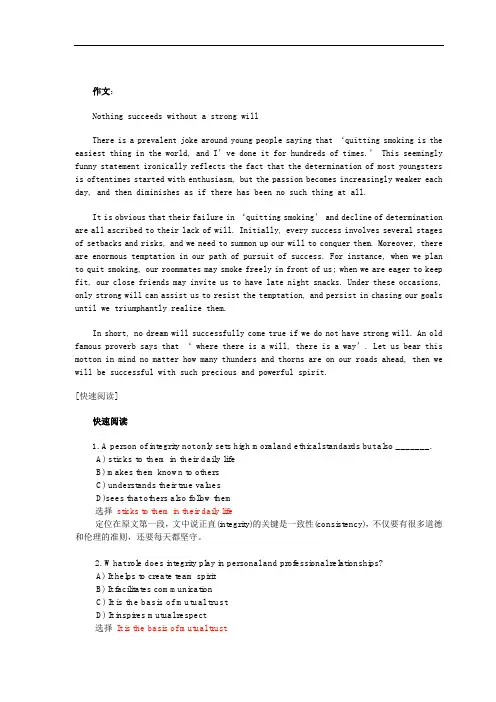
作文:Nothing succeeds without a strong willThere is a prevalent joke around young people saying that ‘quitting smoking is the easiest thing in the world, and I’ve done it for hundreds of times.’ This seemingly funny statement ironically reflects the fact that the determination of most youngsters is oftentimes started with enthusiasm, but the passion becomes increasingly weaker each day, and then diminishes as if there has been no such thing at all.It is obvious that their failure in ‘quitting smoking’ and decline of determination are all ascribed to their lack of will. Initially, every success involves several stages of setbacks and risks, and we need to summon up our will to conquer them. Moreover, there are enormous temptation in our path of pursuit of success. For instance, when we plan to quit smoking, our roommates may smoke freely in front of us; when we are eager to keep fit, our close friends may invite us to have late night snacks. Under these occasions, only strong will can assist us to resist the temptation, and persist in chasing our goals until we triumphantly realize them.In short, no dream will successfully come true if we do not have strong will. An old famous proverb says that ‘ where there is a will, there is a way’. Let us bear this motton in mind no matter how many thunders and thorns are on our roads ahead, then we will be successful with such precious and powerful spirit.[快速阅读]快速阅读1. A person of integrity not only sets high moral and ethical standards but also _______.A) sticks to them in their daily lifeB) makes them known to othersC) understands their true valuesD)sees that others also follow them选择sticks to them in their daily life定位在原文第一段,文中说正直(integrity)的关键是一致性(consistency),不仅要有很多道德和伦理的准则,还要每天都坚守。
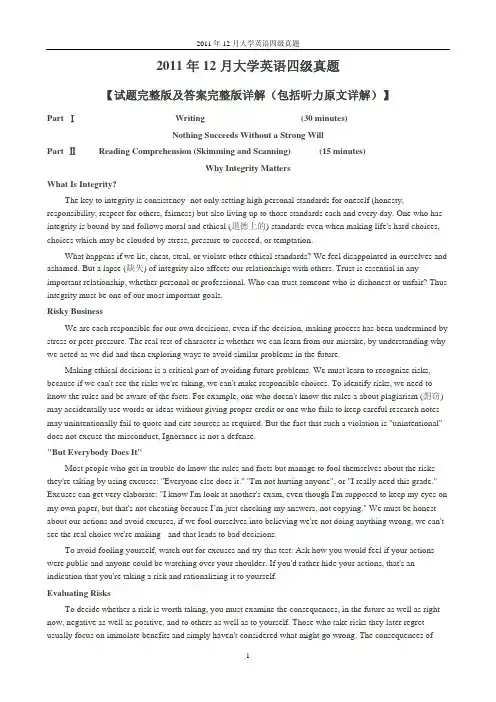
2011年12月大学英语四级真题【试题完整版及答案完整版详解(包括听力原文详解)】PartⅠ Writing (30 minutes)Nothing Succeeds Without a Strong WillPartⅡ Reading Comprehension (Skimming and Scanning) (15 minutes)Why Integrity MattersWhat Is Integrity?The key to integrity is consistency- not only setting high personal standards for oneself (honesty, responsibility, respect for others, fairness) but also living up to those standards each and every day. One who has integrity is bound by and follows moral and ethical (道德上的) standards even when making life's hard choices, choices which may be clouded by stress, pressure to succeed, or temptation.What happens if we lie, cheat, steal, or violate other ethical standards? We feel disappointed in ourselves and ashamed. But a lapse (缺失) of integrity also affects our relationships with others. Trust is essential in any important relationship, whether personal or professional. Who can trust someone who is dishonest or unfair? Thus integrity must be one of our most important goals.Risky BusinessWe are each responsible for our own decisions, even if the decision, making process has been undermined by stress or peer pressure. The real test of character is whether we can learn from our mistake, by understanding why we acted as we did and then exploring ways to avoid similar problems in the future.Making ethical decisions is a critical part of avoiding future problems. We must learn to recognize risks, because if we can't see the risks we're taking, we can't make responsible choices. To identify risks, we need to know the rules and be aware of the facts. For example, one who doesn't know the rules a about plagiarism (剽窃) may accidentally use words or ideas without giving proper credit or one who fails to keep careful research notes may unintentionally fail to quote and cite sources as required. But the fact that such a violation is "unintentional" does not excuse the misconduct, Ignorance is not a defense."But Everybody Does It"Most people who get in trouble do know the rules and facts but manage to fool themselves about the risks they're taking by using excuses: "Everyone else does it." "I'm not hurting anyone", or "I really need this grade." Excuses can get very elaborate: "I know I'm look at another's exam, even though I'm supposed to keep my eyes on my own paper, but that's not cheating because I’m just checking my answers, not copying." We must be honest about our actions and avoid excuses, if we fool ourselves into believing we're not doing anything wrong, we can't see the real choice we're making - and that leads to bad decisions.To avoid fooling yourself, watch out for excuses and try this test: Ask how you would feel if your actions were public and anyone could be watching over your shoulder. If you'd rather hide your actions, that's an indication that you're taking a risk and rationalizing it to yourself.Evaluating RisksTo decide whether a risk is worth taking, you must examine the consequences, in the future as well as right now, negative as well as positive, and to others as well as to yourself. Those who take risks they later regret usually focus on immolate benefits and simply haven't considered what might go wrong. The consequences ofgetting caught are serious and may include a "O" on a test or assignment, an "F" in the class, suspension (暂令停学) or dismissal from school and a ruined reputation. In fact, when you break a role or law, you lose control over your life and give others the power to impose punishment that you have no control over. This is an extremely vulnerable (脆弱的) position. There may be some matters of life and death or highest principle, which might justify such a risk, but there aren't many things that fall in this category.Getting Away with it - Or NotThose who don't get caught pay an even higher price. A cheater doesn't learn from the test, which deprives (剥夺) him her of an education. Cheating undermines confidence and independence: the cheater is a fraud, and knows that without dishonesty, he/she would have failed. Cheating destroys self-respect and integrity, leaving the cheater ashamed, guilty and afraid of getting caught.Worst of all, a cheater who doesn't get caught the first time usually cheats again, not only because he/she is farther behind, but also because it seems "easier." This slippery slope of eroding ethics and bigger risks leads only to disaster. Eventually, the cheater gets caught, and the later he/she gets caught, the worse the consequences. Cheating Hurts Other, TooCheaters often feel invisible, as if their actions "don't count" and don't really hurt anyone. But individual choices have an intense cumulative (累积的) effect. Cheating can spread like a disease. Recent statistics suggest 30%or more of college students cheat. If a class is graded on a curve, cheating hurts others' grades. Even if there is no curve, cheating "poisons" the classroom, and others may feel pressured to join in. ("If I don't cheat I can't compete with those who do") Cheating also has a destructive impact on teachers. The real reward of goof teaching is seeing students learn. But a cheater says. "I'm not interested in what you're trying to teach, all I care about is stealing a grade, regardless of the effect on others." The end result is a destructive attack on the quality of your education. Finally, cheating can hurt the reputation of the university and harm those who worked hard for their degree.Why Integrity MartenIf cheating becomes the norm, then we are in big trouble. We must rely on the honesty and good faith of others, if not, we couldn't put money in the bank, buy food, clothing, or medicine from others, drive across a bridge, get on a plane, go to the dentist--the list is endless. There are many examples of the vast harm that is caused when individuals forget or ignore the effect their dishonesty can have. The savings and loan scandal, the stock market and junk bond swindles, and, of course, Watergate, have undermined the faith of many Americans in the integrity of political and economic leaders and society as a whole. Such incidents take a tremendous toll on our nation's economy and our individual well-being. For example, but for the savings and loan debacle, there might be funds available to reduce the national debt and pay for education.In sum, we all have a common stake in our school, our community, and our society. Our actions do matter. It is essential that we act with integrity in order to build the kind of world in which we want to live.1. A person of integrity not only sets high moral and ethical standards but also _______.A) sticks to them in their daily life B) makes them known to othersC) understands their true values D) sees that others also follow them2. What role does integrity play in personal and professional relationships?A) It helps to create team spirit B) It facilitates communicationC) It is the basis of mutual trust D) It inspires mutual respect3. why must we learn to identify the risks we are going to take?A. To ensure we make responsible choices.B. To avoid being overwhelmed by stress.C. So that we don’t break any rules.D. So that we don’t run into trouble.4. Violation of a rule is misconduct even if _______?A. it has caused no harm.B. it is claimed to be unintentional.C. it has gone unnoticed.D. it is committed with good intentions.5. What should one do if he doesn’t wish to fool himself?A. Avoid making excuses.B. Listen to other people’s advice.C. Make his intensions public.D. Have others watch over his shoulder.6. Those who take risks they regret later on _______.A. will often become more cautiousB. are usually very aggressiveC. value immediate benefits most.D. may lose everything in the end7. According to the author, a cheater who doesn’t get caught right away will _______.A) pay more dearly B) become more confidentC) be widely admired D) feel somewhat lucky8. Cheaters at exam don’t care about their education, all they care about is how to __________.9. Integrity matters in that all social activities rely on ___________.10. Many Americans lost faith in the integrity of their political leaders as a result of __________.Part III Listening Comprehension (35 minutes)Section A注意:此部分试题请在答题卡2上作答。
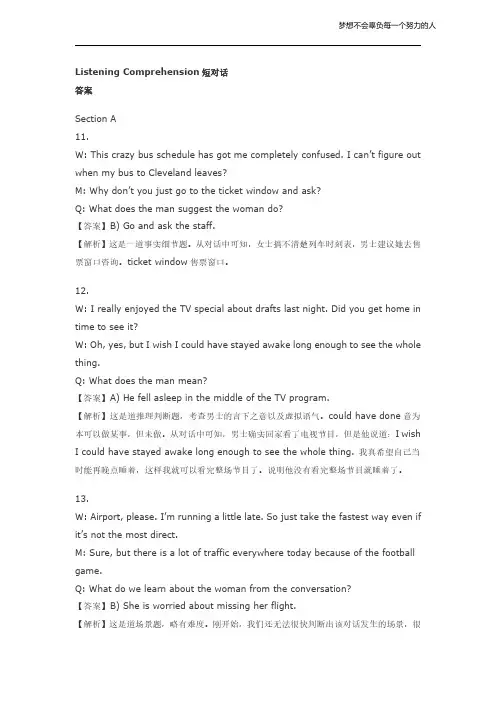
Listening Comprehension短对话答案Section A11.W:This crazy bus schedule has got me completely confused.I can’t figure out when my bus to Cleveland leaves?M:Why don’t you just go to the ticket window and ask?Q:What does the man suggest the woman do?【答案】B)Go and ask the staff.【解析】这是一道事实细节题。
从对话中可知,女士搞不清楚列车时刻表,男士建议她去售票窗口咨询。
ticket window售票窗口。
12.W:I really enjoyed the TV special about drafts last night.Did you get home in time to see it?W:Oh,yes,but I wish I could have stayed awake long enough to see the whole thing.Q:What does the man mean?【答案】A)He fell asleep in the middle of the TV program.【解析】这是道推理判断题,考查男士的言下之意以及虚拟语气。
could have done意为本可以做某事,但未做。
从对话中可知,男士确实回家看了电视节目,但是他说道:I wish I could have stayed awake long enough to see the whole thing.我真希望自己当时能再晚点睡着,这样我就可以看完整场节目了。
说明他没有看完整场节目就睡着了。
13.W:Airport,please.I’m running a little late.So just take the fastest way even if it’s not the most direct.M:Sure,but there is a lot of traffic everywhere today because of the football game.Q:What do we learn about the woman from the conversation?【答案】B)She is worried about missing her flight.【解析】这是道场景题,略有难度。
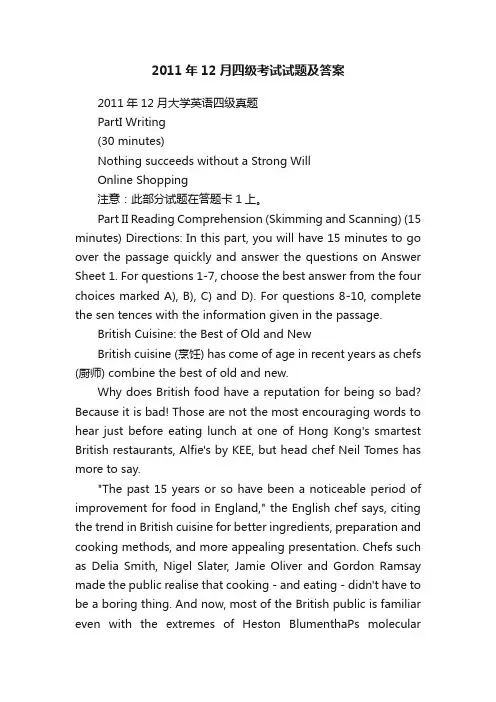
2011年12月四级考试试题及答案2011年12月大学英语四级真题PartI Writing(30 minutes)Nothing succeeds without a Strong WillOnline Shopping注意:此部分试题在答题卡1上。
Part II Reading Comprehension (Skimming and Scanning) (15 minutes) Directions: In this part, you will have 15 minutes to go over the passage quickly and answer the questions on Answer Sheet 1. For questions 1-7, choose the best answer from the four choices marked A), B), C) and D). For questions 8-10, complete the sen tences with the information given in the passage.British Cuisine: the Best of Old and NewBritish cuisine (烹饪) has come of age in recent years as chefs (厨师) combine the best of old and new.Why does British food have a reputation for being so bad? Because it is bad! Those are not the most encouraging words to hear just before eating lunch at one of Hong Kong's smartest British restaurants, Alfie's by KEE, but head chef Neil T omes has more to say."The past 15 years or so have been a noticeable period of improvement for food in England," the English chef says, citing the trend in British cuisine for better ingredients, preparation and cooking methods, and more appealing presentation. Chefs such as Delia Smith, Nigel Slater, Jamie Oliver and Gordon Ramsay made the public realise that cooking - and eating - didn't have to be a boring thing. And now, most of the British public is familiar even with the extremes of Heston BlumenthaPs moleculargastronomy, a form of cooking that employs scientific methods to create the perfect dish."It's no longer the case that the common man in England is embarrassed to show he knows about food," Tomes says.There was plenty of room for improvement. The problems with the nation's cuisine can be traced back to the Second World War. Before the War, much of Britain's food was imported and when German U-boatsbegan attacking ships bringing food to the country, Britain went on rations (配给)."As rationing came to an end in the 1950s, technology picked up and was used to mass-produce food," T omes says. "And by then people were just happy to have a decent quantity of food in their kitchens." They weren't looking for cured meats, organic produce or beautiful presentation; they were looking for whatever they could get their hands on, and this prioritisation of quantity over quality prevailed for decades, meaning a generation was brought up with food that couldn't compete with neighbouring France, Italy, Belgium or Spain.Before star chefs such as Oliver began making cooking fashionable, it was hard to find a restaurant in London that was open after 9pm. But in recent years the capital's culinary (烹饪的) scene has developedto the point that it is now confident of its ability to please the tastes of any international visitor.With the opening of Alfie's in April, and others such as The Pawn, two years ago, modern British food has made its way to Hong Kong. "With British food, I think that Hong Kong restaurants are keeping up," says David Tamlyn, the Welsh executive chef at The Pawn in Wan Chai. "Hong Kong diners areextremely responsive to new ideas or presentations, which is good news for new dishes."Chefs agree that diners in Hong Kong are embracing the modern British trend. Some restau rants aremodifying the recipes (菜谱) of British dishes to breathe new life into the classics, while others are usingbetter quality ingredients but remaining true to British traditions and tastes.Tamlyn is in the second camp. "We select our food very particularly. We use US beef, New Zealand lamb and for our custards (牛奶蛋糊)we use Bird's Custard Powder," Tamlyn says. "Some restaurants go forcustard made fresh with eggs, sugar and cream, but British custard is different, and we stay true to that." Matthew Hill, senior manager at the two-year-old SoHo restaurant Yorkshire Pudding, also uses better ingredients as a means of improving dishes. "There are a lot of existing perceptions about British food and so we can't alter these too much. We're a traditional British restaurant so there are some staples (主菜) that will remain essentially unchanged."These traditional dishes include fish and chips, steak and kidney pie and large pieces of roasted meats. At Alfie's, the newest of the British restaurants in town and perhaps the most gentlemen's club-like indesign, Neil Tomes explains his passion for provenance (原产地)."Britain has started to become reallyproud of the food it's producing. It has excellent organic farms, beautifully crafted cheeses, high-quality meats."However, the British don't have a history of exporting their foodstuffs, which makes it difficult for restaurants in Hong Kongto source authentic ingredients."We can get a lot of our ingredients once a week from the UK," Tamlyn explains. "But there is also pressure to buy local and save on food miles, which means we take our vegetables from the local markets, and there are a lot that work well with British staples."The Phoenix, in Mid-Levels, offers the widest interpretation of "British cuisine", while still trying to maintain its soul. The gastro-pub has existed in various locations in Hong Kong since 2002. Singaporean head chef Tommy Teh Kum Chai offers daily specials on a blackboard, rather than sticking to a menu. This enables him to reinterpret British cuisine depending on what is avail able in the local markets. "We use a lot of ingredients that people wouldn't perhaps associate as British, but are pre sented in a British way. Bell peppers stuffed with couscous, alongside ratatouille, is a very popular dish."Although the ingredients may not strike diners as being traditional, they can be found in dishes across Britain.Even the traditional chefs are aware of the need to adapt to local tastes and customs, while maintaining the Britishness of their cuisine.At Yorkshire Pudding, Hill says that his staff asks diners whether they would like to share their meals. Small dishes, shared meals and "mixing it up" is not something commonly done in Britain, but Yorkshire Pudding will bring full dishes to the table and offer individual plates for each diner. "That way, people still get the presentation of the dishes as they were designed, but can carve them up however they like," Hill says.This practice is also popular at The Pawn, although largely for rotisseries (烤肉馆),Tamlyn says. "Sometables will arrive on a Sunday, order a whole chicken and a shoulder of lamb or a baby pig, and just stay for hours enjoying everything we bring out for them."Some British traditions are too sacred (神圣的)to mess with, however, T omes says. "I'd never change afull English breakfast."注意:此部分试题请在答题卡1上作答。
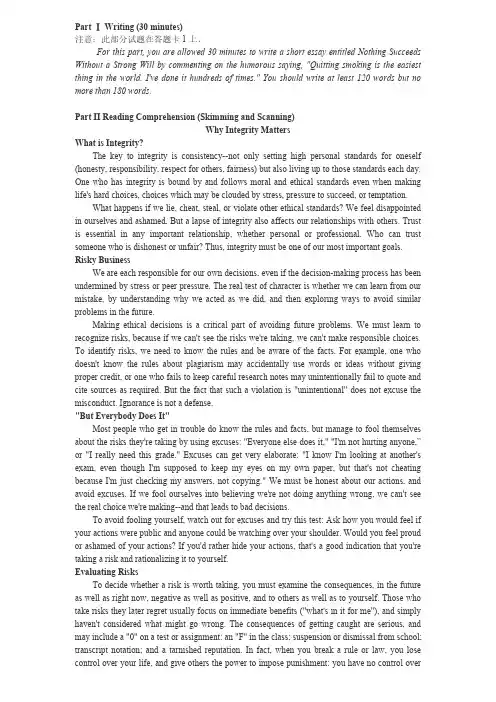
Part Ⅰ Writing (30 minutes)注意:此部分试题在答题卡1上. For this part, you are allowed 30 minutes to write a short essay entitled Nothing Succeeds Without a Strong Will by commenting on the humorous saying, "Quitting smoking is the easiest thing in the world. I've done it hundreds of times." You should write at least 120 words but no more than 180 words.Part II Reading Comprehension (Skimming and Scanning)Why Integrity MattersWhat is Integrity? The key to integrity is consistency--not only setting high personal standards for oneself (honesty, responsibility, respect for others, fairness) but also living up to those standards each day. One who has integrity is bound by and follows moral and ethical standards even when making life's hard choices, choices which may be clouded by stress, pressure to succeed, or temptation. What happens if we lie, cheat, steal, or violate other ethical standards? We feel disappointed in ourselves and ashamed. But a lapse of integrity also affects our relationships with others. Trust is essential in any important relationship, whether personal or professional. Who can trust someone who is dishonest or unfair? Thus, integrity must be one of our most important goals. Risky Business We are each responsible for our own decisions, even if the decision-making process has been undermined by stress or peer pressure. The real test of character is whether we can learn from our mistake, by understanding why we acted as we did, and then exploring ways to avoid similar problems in the future. Making ethical decisions is a critical part of avoiding future problems. We must learn to recognize risks, because if we can't see the risks we're taking, we can't make responsible choices. To identify risks, we need to know the rules and be aware of the facts. For example, one who doesn't know the rules about plagiarism may accidentally use words or ideas without giving proper credit, or one who fails to keep careful research notes may unintentionally fail to quote and cite sources as required. But the fact that such a violation is "unintentional" does not excuse the misconduct. Ignorance is not a defense."But Everybody Does It" Most people who get in trouble do know the rules and facts, but manage to fool themselves about the risks they're taking by using excuses: "Everyone else does it," "I'm not hurting anyone,” or "I really need this grade." Excuses can get very elaborate: "I know I'm looking at another's exam, even though I'm supposed to keep my eyes on my own paper, but that's not cheating because I'm just checking my answers, not copying." We must be honest about our actions, and avoid excuses. If we fool ourselves into believing we're not doing anything wrong, we can't see the real choice we're making--and that leads to bad decisions. To avoid fooling yourself, watch out for excuses and try this test: Ask how you would feel if your actions were public and anyone could be watching over your shoulder. Would you feel proud or ashamed of your actions? If you'd rather hide your actions, that's a good indication that you're taking a risk and rationalizing it to yourself.Evaluating Risks To decide whether a risk is worth taking, you must examine the consequences, in the future as well as right now, negative as well as positive, and to others as well as to yourself. Those who take risks they later regret usually focus on immediate benefits ("what's in it for me"), and simply haven't considered what might go wrong. The consequences of getting caught are serious, and may include a "0" on a test or assignment; an "F" in the class; suspension or dismissal from school; transcript notation; and a tarnished reputation. In fact, when you break a rule or law, you lose control over your life, and give others the power to impose punishment: you have no control overwhat that punishment might be. This is an extremely precarious and vulnerable position. There may be some matters of life and death, or highest principle, which might justify such a risk, but there aren't many things that fall in this category.Getting Away With It--Or Not Those who don't get caught pay an even higher price. A cheater doesn't learn from the test, depriving him/herself of an education. Cheating undermines confidence and independence: the cheater is a fraud, and knows that without dishonesty, he/she would have failed. Cheating destroys self-esteem and integrity, leaving the cheater ashamed, guilty, and afraid of getting caught. Worst of all, a cheater who doesn't get caught the first time usually cheats again, not only because he/she is farther behind, but also because it seems "easier." This slippery slope of eroding ethics and bigger risks leads only to disaster. Eventually, the cheater gets caught, and the later he/she gets caught, the worse the consequences. Students have been dismissed from school because they didn't get this simple message: Honesty is the ONLY policy that works.Cheating Hurts Others, Too Cheaters often feel invisible, as if their actions "don't count" and don't really hurt anyone. But individual choices have a profound cumulative effect. Cheating can spread like a disease, and a cheater can encourage others just by being seen from across the room. Recent statistics suggest 30% or more of college students cheat. If a class is graded on a curve, cheating hurts others' grades. Even if there is no curve, cheating "poisons" the classroom, and others may feel pressured to join in. ("If I don't cheat, I can't compete with those who do.") Cheating also has a destructive impact on teachers. The real reward of good teaching is seeing students learn, but a cheater says, "I'm not interested in what you're trying to teach; all I care about is stealing a grade, regardless of the effect on others." The end result is a blatant and destructive attack on the quality of your education. Finally, cheating can hurt the reputation of the University, and harm those who worked hard for their degree.Why Integrity Matters If cheating becomes the norm, then we are in big trouble. We must rely on the honesty and good faith of others every day. If not, we couldn't put money in the bank, buy food, clothing, or medicine from others, drive across a bridge, get on a plane, go to the dentist--the list is endless. There are many examples of the vast harm that is caused when individuals forget or ignore the effect their dishonesty can have. The savings and loan scandal, the stock market and junk bond swindles, and, of course, Watergate, have undermined the faith of many Americans in the integrity of political and economic leaders and society as a whole. Such incidents take a tremendous toll on our nation's economy and our individual well-being. For example, but for the savings and loan debacle, there might be funds available to reduce the national debt and pay for education. In sum, we all have a common stake in our school, our community, and our society. Our actions do matter. It is essential that we act with integrity in order to build the kind of world in which we want to live.1. A person of integrity not only sets high moral and ethical standards but also _______。
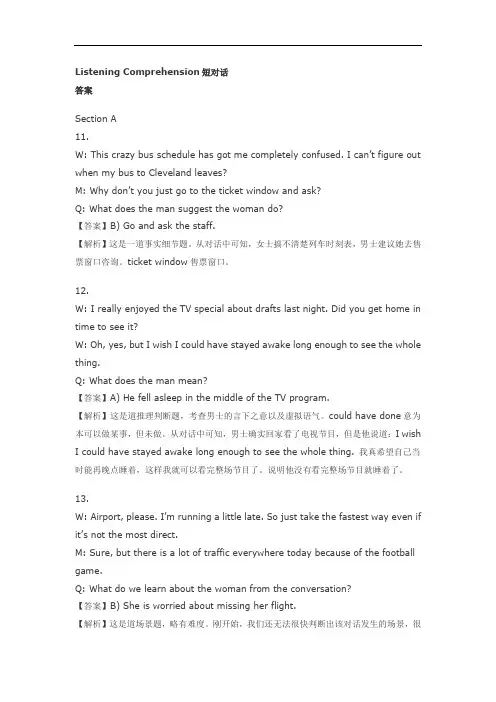
Listening Comprehension短对话答案Section A11.W: This crazy bus schedule has got me completely confused. I can’t figure out when my bus to Cleveland leaves?M: Why don’t you just go to the ticket window and ask?Q: What does the man suggest the woman do?【答案】B) Go and ask the staff.【解析】这是一道事实细节题。
从对话中可知,女士搞不清楚列车时刻表,男士建议她去售票窗口咨询。
ticket window售票窗口。
12.W: I really enjoyed the TV special about drafts last night. Did you get home in time to see it?W: Oh, yes, but I wish I could have stayed awake long enough to see the whole thing.Q: What does the man mean?【答案】A) He fell asleep in the middle of the TV program.【解析】这是道推理判断题,考查男士的言下之意以及虚拟语气。
could have done意为本可以做某事,但未做。
从对话中可知,男士确实回家看了电视节目,但是他说道:I wish I could have stayed awake long enough to see the whole thing. 我真希望自己当时能再晚点睡着,这样我就可以看完整场节目了。
说明他没有看完整场节目就睡着了。
13.W: Airport, please. I’m running a little late. So just take the fastest way even if it’s not the most direct.M: Sure, but there is a lot of traffic everywhere today because of the football game.Q: What do we learn about the woman from the conversation?【答案】B) She is worried about missing her flight.【解析】这是道场景题,略有难度。
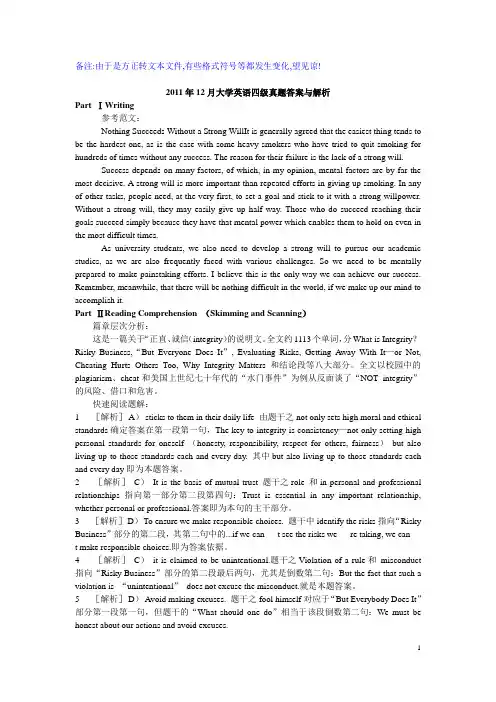
备注:由于是方正转文本文件,有些格式符号等都发生变化,望见谅!2011年12月大学英语四级真题答案与解析Part ⅠWriting参考范文:Nothing Succeeds Without a Strong WillIt is generally agreed that the easiest thing tends to be the hardest one, as is the case with some heavy smokers who have tried to quit smoking for hundreds of times without any success. The reason for their failure is the lack of a strong will.Success depends on many factors, of which, in my opinion, mental factors are by far the most decisive. A strong will is more important than repeated efforts in giving up smoking. In any of other tasks, people need, at the very first, to set a goal and stick to it with a strong willpower. Without a strong will, they may easily give up half way. Those who do succeed reaching their goals succeed simply because they have that mental power which enables them to hold on even in the most difficult times.As university students, we also need to develop a strong will to pursue our academic studies, as we are also frequently faced with various challenges. So we need to be mentally prepared to make painstaking efforts. I believe this is the only way we can achieve our success. Remember, meanwhile, that there will be nothing difficult in the world, if we make up our mind to accomplish it.Part ⅡReading Comprehension (Skimming and Scanning)篇章层次分析:这是一篇关于“正直、诚信(integrity)的说明文。
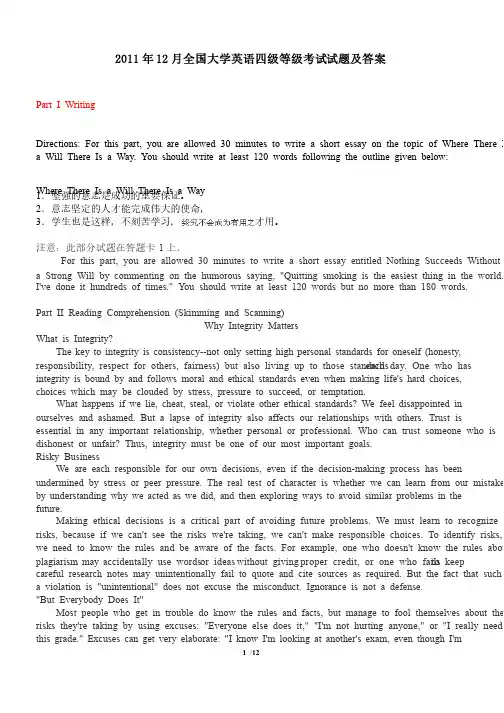
2011年12月全国大学英语四级等级考试试题及答案Part I WritingDirections: For this part, you are allowed 30 minutes to write a short essay on the topic of Where There I a Will There Is a Way. You should write at least 120 words following the outline given below: Where There Is a Will There Is a Way 1.坚强的意志是成功的重要保证。
.坚强的意志是成功的重要保证。
2.意志坚定的人才能完成伟大的使命,3.学生也是这样,不刻苦学习,才用。
才用。
注意:此部分试题在答题卡1上.For this part, you are allowed 30 minutes to write a short essay entitled Nothing Succeeds Without a Strong Will by commenting on the humorous saying, "Quitting smoking is the easiest thing in the world. I've done it hundreds of times." You should write at least 120 words but no more than 180 words. Part II Reading Comprehension (Skimming and Scanning) Why Integrity Matters What is Integrity? The key to integrity is consistency--not only setting high personal standards for oneself (honesty, each day. One who has responsibility, respect for others, fairness) but also living up to those standards integrity is bound by and follows moral and ethical standards even when making life's hard choices, choices which may be clouded by stress, pressure to succeed, or temptation. What happens if we lie, cheat, steal, or violate other ethical standards? We feel disappointed in ourselves and ashamed. But a lapse of integrity also affects our relationships with others. Trust is essential in any important relationship, whether personal or professional. Who can trust someone who is dishonest or unfair? Thus, integrity must be one of our most important goals. Risky Business We are each responsible for our own decisions, even if the decision-making process has been undermined by stress or peer pressure. The real test of character is whether we can learn from our mistake by understanding why we acted as we did, and then exploring ways to avoid similar problems in the future. Making ethical decisions is a critical part of avoiding future problems. We must learn to recognize risks, because if we can't see the risks we're taking, we can't make responsible choices. To identify risks, we need to know the rules and be aware of the facts. For example, one who doesn't know the rules abouto keep plagiarism may accidentally use words or ideas without giving proper credit, or one who fails careful research notes may unintentionally fail to quote and cite sources as required. But the fact that such a violation is "unintentional" does not excuse the misconduct. Ignorance is not a defense. "But Everybody Does It" Most people who get in trouble do know the rules and facts, but manage to fool themselves about the risks they're taking by using excuses: "Everyone else does it," "I'm not hurting anyone," or "I really need this grade." Excuses can get very elaborate: "I know I'm looking at another's exam, even though I'm supposed to keep my eyes on my own paper, but that's not cheating because I'm just checking my answers not copying." We must be honest about our actions, and avoid excuses. If we fool ourselves into believing we're not doing anything wrong, we can't see the real choice we're making--and that leads to bad decisions. To avoid fooling yourself, watch out for excuses and try this test: Ask how you would feel if your actions were public, and anyone could be watching over your shoulder. Would you feel proud or ashamed of your actions? If you'd rather hide your actions, that's a good indication that you're taking a risk and rationalizing it to yourself. Evaluating Risks To decide whether a risk is worth taking, you must examine the consequences, in the future as well as right now, negative as well as positive, and to others as well as to yourself. Those who take risks the later regret usually focus on immediate benefits ("what's in it for me"), and simply haven't considered what might go wrong. The consequences of getting caught are serious, and may include a "0" on a test o assignment; an "F" in the class; suspension or dismissal from school; transcript notation; and a tarnished reputation. In fact, when you break a rule or law, you lose control over your life, and give others the power to impose punishment: you have no control over what that punishment might be. This is an life and death, or highest extremely precarious and vulnerable position. There may be some matters of principle, which might justify such a risk, but there aren't many things that fall in this category. Getting Away With It--Or Not Those who don't get caught pay an even higher price. A cheater doesn't learn from the test, depriving him/herself of an education. Cheating undermines confidence and independence: the cheater is a fraud, and knows that without dishonesty, he/she would have failed. Cheating destroys self-esteem and integrity, leaving the cheater ashamed, guilty, and afraid of getting caught. Worst of all, a cheater who doesn't get caught the first time usually cheats again, not only because he/she is farther behind, but also because it seems "easier." This slippery slope of eroding ethics and bigger risks leads only to disaster. Eventually, the cheater gets caught, and the later he/she gets caught, the worse the consequences. Students have been dismissed from school because they didn't get this simple message: Honesty is the ONLY policy that works. Cheating Hurts Others, Too Cheaters often feel invisible, as if their actions "don't count" and don't really hurt anyone. But individual choices have a profound cumulative effect. Cheating can spread like a disease, and a cheater can encourage others just by being seen from across the room. Recent statistics suggest 30% or more of college students cheat. If a class is graded on a curve, cheating hurts others' grades. Even if there is n curve, cheating "poisons" the classroom, and others may feel pressured to join in. ("If I don't cheat, I can't compete with those who do.") Cheating also has a destructive impact on teachers. The real reward of good teaching is seeing students learn, but ⑧.a cheater says, "I'm not interested in what you're trying to teach; all I care about is stealing a grade, regardless of the effect on others." The end result is a blatayour education. Finally, cheating can hurt the reputation of the and destructive attack on the quality of University, and harm those who worked hard for their degree. Why Integrity Matters If cheating becomes the norm, then we are in big trouble. ⑨.We must rely on the honesty and good faith of others every day. If not, we couldn't put money in the bank, buy food, clothing, or medicine from others, drive across a bridge, get on a plane, go to the dentist--the list is endless. There are many example of the vast harm that is caused when individuals forget or ignore the effect their dishonesty can have. The savings and loan scandal, the stock market and junk bond swindles, and, of course, ⑩.Watergate, have undermined the faith of many Americans in the integrity of political and economic leaders and society as a whole. Such incidents take a tremendous toll on our nation's economy and our individual well-being. For example, but for the savings and loan debacle, there might be funds available to reduce the national debt and pay for education. In sum, we all have a common stake in our school, our community, and our society. Our actions do matter. It is essential that we act with integrity in order to build the kind of world in which we want live. 1. A person of integrity not only sets high moral and ethical standards but also _______。
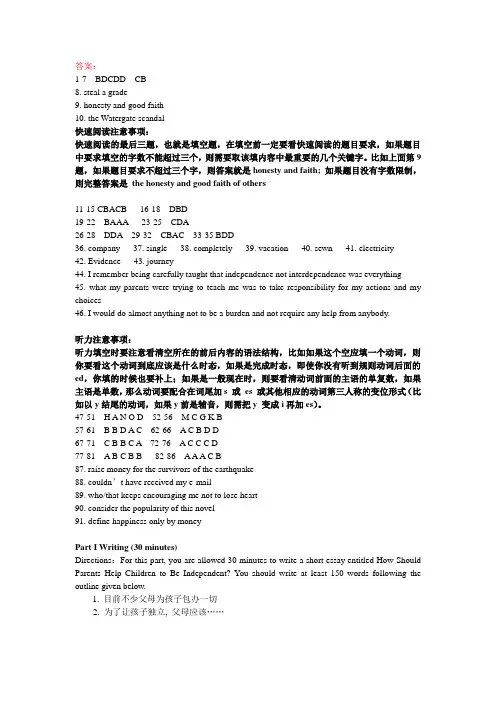
答案:1-7 BDCDD CB8. steal a grade9. honesty and good faith10. the Watergate scandal快速阅读注意事项:快速阅读的最后三题,也就是填空题,在填空前一定要看快速阅读的题目要求,如果题目中要求填空的字数不能超过三个,则需要取该填内容中最重要的几个关键字。
比如上面第9题,如果题目要求不超过三个字,则答案就是honesty and faith; 如果题目没有字数限制,则完整答案是the honesty and good faith of others11-15 CBACB 16-18 DBD19-22 BAAA 23-25 CDA26-28 DDA 29-32 CBAC 33-35 BDD36. company 37. single 38. completely 39. vacation 40. sewn 41. electricity42. Evidence 43. journey44. I remember being carefully taught that independence not interdependence was everything45. what my parents were trying to teach me was to take responsibility for my actions and my choices46. I would do almost anything not to be a burden and not require any help from anybody.听力注意事项:听力填空时要注意看清空所在的前后内容的语法结构,比如如果这个空应填一个动词,则你要看这个动词到底应该是什么时态,如果是完成时态,即使你没有听到规则动词后面的ed,你填的时候也要补上;如果是一般现在时,则要看清动词前面的主语的单复数,如果主语是单数,那么动词要配合在词尾加s 或es 或其他相应的动词第三人称的变位形式(比如以y结尾的动词,如果y前是辅音,则需把y 变成i再加es)。
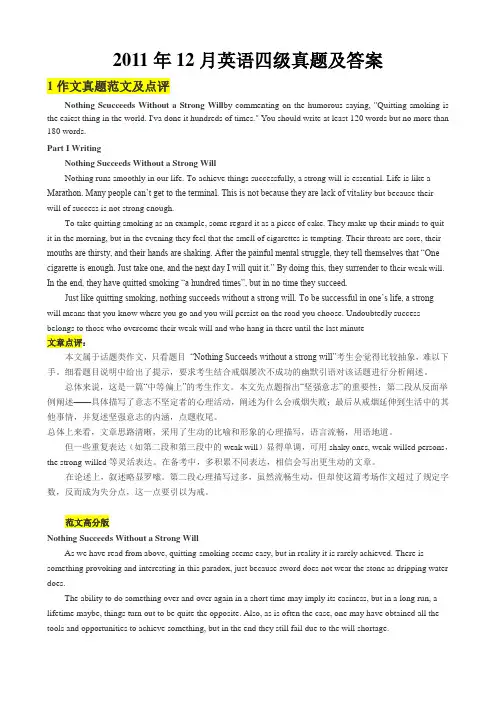
2011年12月英语四级真题及答案1作文真题范文及点评Nothing Scucceeds Without a Strong Will by commenting on the humorous saying, "Quitting smoking is the eaiest thing in the world. I'va done it hundreds of times." You should write at least 120 words but no more than 180 words.Part I WritingNothing Succeeds Without a Strong WillNothing runs smoothly in our life. To achieve things successfully, a strong will is essential. Life is like a Marathon. Many people can’t get to the terminal. This is not because they are lack of vit ality but because theirwill of success is not strong enough.To take quitting smoking as an example, some regard it as a piece of cake. They make up their minds to quit it in the morning, but in the evening they feel that the smell of cigarettes is tempting. Their throats are sore, their mouths are thirsty, and their hands are shaking. After the painful mental struggle, they tell themselves that “One cigarette is enough. Just take one, and the next day I will quit it.” By doing this, they surrender to th eir weak will. In the end, they have quitted smoking “a hundred times”, but in no time they succeed.Just like quitting smoking, nothing succeeds without a strong will. To be successful in one’s life, a strongwill means that you know where you go and you will persist on the road you choose. Undoubtedly success belongs to those who overcome their weak will and who hang in there until the last minute文章点评:本文属于话题类作文,只看题目“Nothing Succeeds without a strong will”考生会觉得比较抽象,难以下手。
2011年12月大学英语四级真题及答案(仔细阅读部分)仔细阅读:Passage One :Absence of girls removes pressure to conform to masculine stereotype ,claims US researcher美国研究者认为,男女分校有利于帮男生消除男性形象的压力美国研究者认为,男女分校有利于帮男生消除男性形象的压力Rachel Williams The Guardian ,Wednesday 20 January 2010 Boys' schools are the perfect place to teach young men to express their emotions and are more likely to get involved in activities such as art , dance and music , according to research released today . 据今日发布的研究表示,男校是教育年轻男性表达情感最佳的地点,也更有可能让他们进行艺术、跳舞和音乐等活动。
进行艺术、跳舞和音乐等活动。
Far from the traditional image of a culture of aggressive masculinity in which students either sink or swim ,the absence of girlsgives boys the chance to develop without pressure toconform to a stereotype , the US study says .这项美国研究说明,与传统文化形象强调的凡事靠自己、与传统文化形象强调的凡事靠自己、进取向上的男性特征不同,进取向上的男性特征不同,进取向上的男性特征不同,学学校里没有女生,给了男生在没有典型形象压力下自主发展的机会。
Nothing succeeds without a strong willThere is a prevalent joke around young people saying that …quitting smoking is the easiest thing in the world, and I’ve done it for hundreds of times.‟ This seemingly funny statement ironically reflects the fact that the determination of most youngsters is often started with enthusiasm, but the passion becomes increasingly weaker each day, and then diminishes as if there has been no such thing at all.It is obvious that their failure in …quitting smoking‟ and decli ne of determination are all ascribed to their lack of will. Initially, every success involves several stages of setbacks and risks, and we need to summon up our will to conquer them. Moreover, there are enormous temptation in our path of pursuit of success. For instance, when we plan to quit smoking, our roommates may smoke freely in front of us; when we are eager to keep fit, our close friends may invite us to have late night snacks. Under these occasions, only strong will can assist us to resist the temptation, and persist in chasing our goals until we triumphantly realize them.In short, no dream will successfully come true if we do not have strong will. An old famous proverb says that …where there is a will, there is a way‟. Let us bear this motto in mind no matter how many thunders and thorns are on our roads ahead, and then we will be successful with such precious and powerful spirit.1. A) sticks to them in their daily life2. C) It is the basis of mutual trust3. A) To ensure we make responsible choices.4. B). it is claimed to be unintentional.5. A). Avoid making excuses.6. C). value immediate benefits most.7. A) pay more dearly8. steal a grade.9. honesty and good faith.10、the Watergate scandal11-15 BDCAB 16-20 DABCC21-25 CBCCD 26-30 CBABD31-35 BDABA36. company37. single38. completely39. vacation40. sewn41. electricity42. evidence43. journey44. I remember being carefully taught that independence, not interdependence,was everything45. what my parents were trying to teach me was to take responsibility for my actions and my choices.46. I would do almost anything not to be a burden, and not require any help from anybody.47、H 根据this确定此空必然填一单数名词,15词中D/E/H备选,E/H 相似,其中必有一个答案,前文所说人口、能源消耗等,均只能用“增长”来指代,而不能说是进步;故选择H.growth,根据相似原则,E和H可以一起划去。
2011年12月大学英语四级考试真题及答案详解Part I Writing (30 minutes)Directions:For this part, you are allowed 30 minutes to write a short essay entitled How Should Parents Help Children to Be Independent? You should write at least 150 words following the outline given below.1. 目前不少父母为孩子包办一切2. 为了让孩子独立, 父母应该……How Should Parents Help Children to Be Independent?..Part II Reading Comprehension(Skimming and Scanning) (15 minutes)Directions: In this part, you will have 15 minutes to go over the passage quickly and answer the questions on Answer Sheet 1. For questions 1-7, choose the best answer from the four choices marked [A], [B], [C] and [D]. For questions 8-10, complete the sentences with the information given in the passage.A Grassroots RemedyMost of us spend our lives seeking the natural world. To this end, we walk the dog, play golf, go fishing, sit in the garden, drink outside rather than inside the pub, have a picnic, live in the suburbs, go to the seaside, buy a weekend place in the country. The most popular leisure activity in Britain is going for a walk. And when joggers (慢跑者) jog, they don’t run the streets. Every one of them instinctively heads to the park or the river. It is my profound belief that not only do we all need nature, but we all seek nature, whether we know we are doing so or not.But despite this, our children are growing up nature-deprived (丧失). I spent my boyhood climbing trees on Streatham Common, South London. These days, children are robbed of these ancient freedoms, due to problems like crime, traffic, the loss of the open spaces and odd new perceptions about what is best for children, that is to say, things that can be bought, rather than things that can be found.The truth is to be found elsewhere. A study in the US: families had moved to better housing and the children were assessed for ADHD—attention deficit hyperactivity disorder (多动症). Those whose accommodation had more natural views showed an improvement of 19%; those who had the same improvement in material surroundings but no nice view improved just 4%.A study in Sweden indicated that kindergarten children who could play in a natural environment had less illness and greater physical ability than children used only to a normal playground. A US study suggested that when a school gave children access to a natural environment, academic levels were raised across the entire school.Another study found that children play differently in a natural environment. In playgrounds, children create a hierarchy (等级) based on physical abilities, with the tough ones taking the lead. But when a grassy area was planted with bushes, the children got much more into fantasy play, and the social hierarchy was now based on imagination and creativity.Most bullying (恃强凌弱) is found in schools where there is a tarmac (柏油碎石) playground; the least bullying is in a natural area that the children are encouraged to explore. This reminds me unpleasantly of Sunnyhill School in Streatham, with its harsh tarmac, where I used to hang about in corners fantasising about wildlife.But children are frequently discouraged from involvement with natural spaces, for health and safety reasons, for fear that they might get dirty or that they might cause damage. So, instead, the damage is done to the children themselves: not to their bodies but to their souls.One of the great problems of modern childhood is ADHD, now increasingly and expensively treated with drugs. Yet one study after another indicates that contact with nature gives huge benefits to ADHD children. However, we spend money on drugs rather than on green places.The life of old people is measurably better when they have access to nature. The increasing emphasis for the growing population of old people is in quality rather than quantity of years. And study after study finds that a garden is the single most important thing in finding that quality.In wider and more difficult areas of life, there is evidence to indicate that natural surroundings improve all kinds of things. Even problems with crime and aggressive behaviour are reduced when there is contact with the natural world.Dr William Bird, researcher from the Royal Society for the Protection of Birds, states in his study, “A natural environment c an reduce violent behaviour becau se its restorative process helps reduce anger and impulsive behaviour.” Wild places need encouraging for this reason, no matter how small their contribution.We tend to look on nature conservation as some kind of favour that human beings are granting to the natural world. The error here is far too deep: not only do humans need nature for themselves, but the very idea that humanity and the natural world are separable things is profoundly damaging.Human beings are a species of mammals (哺乳动物). For seven million years they lived on the planet as part of nature. Our ancestral selves miss the natural world and long for contact with non-human life. Anyone who has patted a dog, stroked a cat, sat under a tree with a pint of beer, given or received a bunch of flowers or chosen to walk through the park on a nice day, understands that.We need the wild world. It is essential to our well-being, our health, our happiness. Without the wild world we are not more but less civilised. Without other living things around us we are less than human.Five ways to find harmony with the natural worldWalk: Break the rhythm of permanently being under a roof. Get off a stop earlier, make a circuit of the park at lunchtime, walk the child to and from school, get a dog, feel yourself moving in moving air, look, listen, absorb.Sit: Take a moment, e very now and then, to be still in an open space. In the garden, anywhere that’s not in the office, anywhere out of the house, away from the routine. Sit under a tree, look at water, feel refreshed, ever so slightly renewed.Drink: The best way to enjoy the natural world is by yourself; the second best way is in company. Take a drink outside with a good person, a good gathering: talk with the sun and the wind with birdsong for background.Learn: Expand your boundaries. Learn five species of bird, five butterflies, five trees, five bird songs. That way, you see and hear more: and your mind responds gratefully to the greater amount of wildness in your life.Travel: The places you always wanted to visit: by the seaside, in the country, in the hills. Take a weekend break, a day-trip, get out there and do it: for the scenery, for the way through the woods, for the birds, for the bees. Go somewhere special and bring specialness home. It lasts forever, after all.注意:此部分试题请在答题卡1上作答。
2011年12月英语四级真题及答案解析完整版Part I Writing (1)Part II Reading Comprehension (Skimming and Scanning) (3)Part III Listening Comprehension (7)Section A (7)Conversation One (10)Conversation Two (14)Section B (16)Passage Three (20)Passage Three (26)Section C (35)Passage Two (36)Part V Cloze (36)Part VI Translation (43)Part I Writing【标准版】Nothing Succeeds Without a Strong WillNothing runs smoothly in our life. To achieve things successfully, a strong will is essential. Life is like a Marathon. Many people can’t get to the terminal. This is not because they are lack of vitality but because their will of success is not strong enough.To take quitting smoking as an example, some regard it as a piece of cake. They make up their minds to quit it in the morning, but in the evening they feel that the smell of cigarettes is tempting. Their throats are sore, their mouths are thirsty, and their hands are shaking. After the painful mental struggle, they tell themselves that “One cigarette is enough. Just take one, and the next day I will quit it.” By doing this, they surrender to their weak will. In the end, they have quitted smoking “a hundred times”, but in no time they succeed.Just like quitting smoking, nothing succeeds without a strong will. To be successful in one’s life, a strong will means that you know where you go and you will persist on the road you choose. Undoubtedly success belongs to those who overcome their weak will and who hang in there until the last minute.【文章点评】本文属于话题类作文,只看题目“Nothing Succeeds without a strong will”考生会觉得比较抽象,难以下手。
2011年12月大学英语四级真题及答案汇总2011年12月19日 14:50:00 来源:人民网2011年12月大学英语四六级考试已结束,人民网教育频道第一时间收集整理试题及参考答案,供考生参考,以下为新东方版英语四级真题汇总。
PartⅠWriting (30 minutes)注意:此部分试题在答题卡1上.For this part, you are allowed 30 minutes to write a short essay entitled Nothing Succeeds Without a Strong Will by commenting on the humorous saying, "Quitting smoking is the easiest thing in the world. I've done it hundreds of times." You should write at least 120 words but no more than 180 words.PartⅡReading Comprehension (Skimming and Scanning) (15 minutes)Directions: In this part, you will have 15 minutes to go over the passage quickly and answer the questions on Answer Sheet 1. For questions 1-7 choose the best answer from the fourchoices marked A), B), C) and D). For questions 8-10, complete the sentence with the information given in the passage.Why Integrity MattersWhat Is Integrity?The key to integrity is consistency- not only setting high personal standards for oneself (honesty, responsibility, respect for others, fairness) but also living up to those standards each and every day. One who has integrity is bound by and follows moral and ethical (道德上的) standards even when making life's hard choices, choices which may be clouded by stress, pressure to succeed, or temptation.What happens if we lie, cheat, steal, or violate other ethical standard?(道德底线,道德标准) We feel disappointed in ourselves and ashamed. But a lapse (缺失) of integrity also affects our relationships with others. Trust is essential in any important relationship, whether personal or professional. Who can trust someone who is dishonest or unfair? Thus integrity must be one of our most important goals.Risky Business(乖仔也疯狂)We are each responsible for our own decisions, even if the decision, making process has been undermined by stress or peerpressure. The real test of character is whether we can learn from our mistake, by understanding why we acted as we did and then exploring ways to avoid similar problems in the future.Making ethical decisions is a critical part of avoiding future problems. We must learn to recognize risks, because if we can't see the risks we're taking, we can't make responsible choices. To identify risks, we need to know the rules and be aware of the facts. For example, one who doesn't know the rules a about plagiarism (剽窃) may accidentally use words or ideas without giving proper credit or one who fails to keep careful research notes may unintentionally fail to quote and cite sources as required. But the fact that such a violation is "unintentional" does not excuse the misconduct, Ignorance is not a defense."But Everybody Does It"Most people who get in trouble do know the rules and facts but manage to fool themselves about the risks they're taking by using excuses: "Everyone else does it." "I'm not hurting anyone", or "I really need this grade." Excuses can get very elaborate: "I know I'm look at another's exam, even though I'm supposed to keep my eyes on my own paper, but that's not cheatingbecause I’m just checking my answers, not copying." We must be honest about our actions and avoid excuses, if we fool ourselves into believing we're not doing anything wrong, we can't see the real choice we're making - and that leads to bad decisions.To avoid fooling yourself, watch out for excuses and try this test: Ask how you would feel if your actions were public and anyone could be watching over yore shoulder. If you'd rather hide your actions, that's an indication that you're taking a risk and rationalizing it to yourself.Evaluating RisksTo decide whether a risk is worth taking, you must examine the consequences, in the future as well as right now, negative as well as positive, and to others as well as to yourself. Those who take risks they later regret usually focus on immolate benefits and simply haven't considered what might go wrong. The consequences of getting caught are serious and may include a "O" on a test or assignment, an "F" in the class, suspension (暂令停学) or dismissal from school and a ruined reputation. In fact, when you break a role or law, you lose control over your life and give others the power to impose punishment thatyou have no control over. This is an extremely vulnerable (脆弱的) position. There may be some matters of life and death or highest principle, which might justify such a risk, but there aren't many things that fall in this category.Getting Away with it - Or NotThose who don't get caught pay an even higher price. A cheater doesn't learn from the test, which deprives (剥夺) him her of an education. Cheating undermines confidence and independence: the cheater is a fraud, and knows that without dishonesty, he/she would have failed. Cheating destroysself-respect and integrity, leaving the cheater ashamed, guilty and afraid of getting caught.Worst of all, a cheater who doesn't get caught the first time usually cheats again, not only because he/she is farther behind, but also because it seems "easier." This slippery slope of eroding ethics and bigger risks leads only to disaster. Eventually, the cheater gets caught, and the later he/she gets caught, the worse the consequences.Cheating Hurts Other, TooCheaters often feel invisible, as if their actions "don't count" and don't really hurt anyone. But individual choiceshave an intense cumulative (累积的) effect. Cheating can spread like a disease. Recent statistics suggest 30%or more of college students cheat. If a class is graded on a curve, cheating hurts others' grades. Even if there is no curve, cheating "poisons" the classroom, and others may feel pressured to join in. ("If I don't cheat I can't compete with those who do") Cheating also has a destructive impact on teachers. The real reward of goof teaching is seeing students learn. But a cheater says. " I'm not interested in what you're trying to teach, all I care about is stealing a grade, regardless of the effect on others." The end result is a destructive attack on the quality of your education. Finally, cheating can hurt the reputation of the university and harm those who worked hard for their degree.Why Integrity MartenIf cheating becomes the norm, then we are in big trouble. We must rely on the honesty and good faith of others, if not, we couldn't put money in the bank, buy food, clothing, or medicine from others, drive across a bridge, get on a plane, go to the dentist--the list is endless. There are many examples of the vast harm that is caused when individuals forget or ignore the effect their dishonesty can have. The savings andloan scandal, the stock market and junk bond swindles, and, of course, Watergate, have undermined the faith of many Americans in the integrity of political and economic leaders and society as a whole. Such incidents take a tremendous toll on our nation's economy and our individual well-being. For example, but for the savings and loan debacle, there might be funds available to reduce the national debt and pay for education.In sum, we all have a common stake in our school, our community, and our society. Our actions do matter. It is essential that we act with integrity in order to build the kind of world in which we want to live.1. A person of integrity not only sets high moral and ethical standards but also _______.A) sticks to them in their daily lifeB) makes them known to othersC) understands their true valuesD) sees that others also follow them2. What role does integrity play in personal and professional relationships?A) It helps to create team spiritB) It facilitates communicationC) It is the basis of mutual trustD) It inspires mutual respect3. why must we learn to identify the risks we are going to take?A. To ensure we make responsible choices.B. To avoid being overwhelmed by stress.C. so that we don’t break any rules.D. so that we don’t run into trouble.4. Violation of a rule is misconduct even if _______?A. it has caused no harm.B. it is claimed to be unintentional.C. it has gone unnoticed.D. it is committed with good intentions.5. What should one do if he doesn’t wish to fool himself?A. Avoid making excuses.B. Listen to other people’s advice.C. Make his intensions public.D. Have others watch over his shoulder.6. Those who take risks they regret later on _______.A. will often become more cautiousB. are usually very aggressiveC. value immediate benefits most.D. may lose everything in the end7. According to the author, a cheater who doesn’t get caught right away will _______.A) pay more dearlyB) become more confidentC) be widely admiredD) feel somewhat lucky8. Cheaters at exam don’t care about their education, all they care about is how to stealing a grade9. Integrity matters in that all social activities rely on people’s honesty and good faith.10. Many Americans lost faith in the integrity of their political leaders as a result of the Watergate scandal.PartⅣ Reading Comprehension (Reading in Depth) (25 minutes)Section ADirections: In this section, there is a passage with ten blanks. You are required to select one word for each blank from a list of choices given in a word bank following the passage. Read the passage through carefully before making your choices. Each choice in the bank is identified by letter. Please mark the corresponding letter for each item on Answer Sheet 2 with a single line through the centre. You may not use any of the words in the bank more than once.Questions 47 to 56 are based on the following passage.With the world's population estimated to grow from six to nine billion by 2050, researchers. businesses and governments are already dealing with the impact this increase will have on everything from food and water to infrastructure (基础设施) and jobs. Underling all this47 willbe the demand for energy, which is expected to double over the next 40 years.Finding the resources to meet this demand in a 48 . sustainable way is the cornerstone (基石) of our nation's energy security, and will be one of the major 49 of the 21st century. Alternative forms of energy- bio-fuels, wind and solar, to name a few are 50 being funded and developed, and will play a growing 51 in the world's energy supply. But experts saythat even when 52 , alternative energy sources will likely meet only about 30% of the world's energy needs by 2050.For example, even with 53 investments, such as the $93 million for wind energy development 54 in the American Recovery and Reinvestment Act, important alternative energy sources such as wind and bio-fuels 55 only about 1% of the market today.Energy and sustainability experts say the answer to our future energy needs will likely come from a lot of 56 both traditional and alternative.注意:此部分试题请在答题卡2上作答。
2011年12月英语四级真题及答案(含听力原文)英语四级作文题目Directions: For this part, you are allowed 30 minutes to write a short essay Where There Is a Will There Is a Way . You should write at least 120 words following the outline given below:1. 坚强的意志是成功的重要保证。
2.意志坚定的人才能完成伟大的使命3. 学生也是这样,不刻苦学习,终究不会成为有用之才听力原题11.W:This crazy bus schedule has got me completely confused .I cannot figure out when my bus to Cleveland leaves?M: Why don‟t you just go to the ticket window and ask ?Q: what does the man suggest the woman do ?12.W:I really enjoy the TV Special about ??? last night ? did you get how many ti me to see it ?M : oh yes ,but I wish I could have stayed awake long enough to the see the whole thingQ: what does the man mean ?W: Airport ,please .I‟m learning a little late .so just take the fastest way,even if it‟s not the most directM: sure ,but there‟s a lot of traffic everywhere today because of the football game Q: what do we learn about the women from the conversation?14. W:May I make a recommendation ,sir ,our seafood with the special source is ver y goodM: thank you , but I don‟t eat shellfish. I …m allergic to itQ: where does the conversation most probably take place ?15. W: Now one more question if you don‟t mind. What position in the company ap peals you most?M: Well. I‟d like the position of sales manager, if that position is still vacant。
2011年12月英语四级真题及答案解析完整版Part I Writing【标准版】Nothing Succeeds Without a Strong WillNothing runs smoothly in our life. To achieve things successfully, a strong will is essential. Life is like a Marathon. Many people can’t get to the terminal. This is not because they are lack of vitality but because their will of success is not strong enough.To take quitting smoking as an example, some regard it as a piece of cake. They make up their minds to quit it in the morning, but in the evening they feel that the smell of cigarettes is tempting. Their throats are sore, their mouths are thirsty, and their hands are shaking. After the painful mental struggle, they tell themselves that “One cigarette is enough. Just take one, and the next day I will quit it.” By doing this, they surrender to their weak will. In the end, they have quitted smoking “a hundred times”, but in no time they succeed.Just like quitting smoking, nothing succeeds without a strong will. To be successful in one’s life, a strong will means that you know where you go and you will persist on the road you choose. Undoubtedly success belongs to those who overcome their weak will and who hang in there until the last minute.【文章点评】本文属于话题类作文,只看题目“Nothing Succeeds without a strong will”考生会觉得比较抽象,难以下手。
细看题目说明中给出了提示,要求考生结合戒烟屡次不成功的幽默引语对该话题进行分析阐述。
总体来说,这是一篇“中等偏上”的考生作文。
本文先点题指出“坚强意志”的重要性;第二段从反面举例阐述——具体描写了意志不坚定者的心理活动,阐述为什么会戒烟失败;最后从戒烟延伸到生活中的其他事情,并复述坚强意志的内涵,点题收尾。
总体上来看,文章思路清晰,采用了生动的比喻和形象的心理描写,语言流畅,用语地道。
但一些重复表达(如第二段和第三段中的weak will)显得单调,可用shaky ones,weak-willed persons,the strong-willed等灵活表达。
在备考中,多积累不同表达,相信会写出更生动的文章。
在论述上,叙述略显罗嗦。
第二段心理描写过多,虽然流畅生动,但却使这篇考场作文超过了规定字数,反而成为失分点,这一点要引以为戒。
【高分版】Nothing Succeeds Without a Strong WillAs we have read from above, quitting-smoking seems easy, but in reality it is rarely achieved. There is something provoking and interesting in this paradox, just because sword does not wear the stone as dripping water does.The ability to do something over and over again in a short time may imply its easiness, but in a long run, a lifetime maybe, things turn out to be quite the opposite. Also, as is often the case, one may have obtained all the tools and opportunities to achieve something, but in the end they still fail due to the will shortage.So how could we avoid the dilemma? Here is the prime condition of success: will and perseverance. Concentrate you energy, thought and mind exclusively on the business in which you are engaged, hang on in there and be patient, for, as Emerson put it, no one can cheat you out of your ultimate success but yourself.【文章点评】本次四级作文探讨的话题是成功与毅力之间的关系,话题不算新,一般考生对此都比较熟悉,所以对考生来说难度不大。
写好这篇作文,需要抓住两点,一是紧跟题目要求,即对上述幽默性的话语做出评论,二是在评论的基础上要亮出自己的观点。
范文开头第一句即一针见血地对上述幽默性话语做出总结性概括,即戒烟看似简单实则很难,随后指出该话语本质上是一个悖论,并且以一个“水滴石穿”的俗语来指出困难所在,这句也是本文的一个亮点,体现作者在西方俗语方面丰富的知识储备。
第二段作者则进一步深入分析该话语,指出做某事在短期看来很容易,长期来看,恰恰相反,人们做事的结果也因此总是失败,原因则在最后一句点出:缺乏毅力。
第三段作者进一步给出了自己的观点,告诉大家如何避免陷入这种两难境地:首要条件即需要坚强的意志和长期的坚持。
最后再以艾默生的一句名言“没人能够骗你远离你最终的成功,除非你自己承认失败”来总结全文,切中主题,铿锵有力。
Part II Reading Comprehension (Skimming and Scanning)1. A person of integrity not only sets high moral and ethical standards but also _______.A) sticks to them in their daily lifeB) makes them known to othersC) understands their true valuesD)sees that others also follow them【答案】A) sticks to them in their daily life【解析】第一题的答案就在全文第一句。
关键词是not only…. But also…. ,关键句是The key to integrity is consistency--not only setting high personal standards for oneself (honesty, responsibility, respect for others, fairness) but also living up to those standards each day. 这里的live up to 和选项里的stick to 属于同义替换。
2. What role does integrity play in personal and professional relationships?A) It helps to create team spiritB) It facilitates communicationC) It is the basis of mutual trustD) It inspires mutual respect【答案】C) It is the basis of mutual trust【解析】关键词是personal and professional,关键句是Trust is essential in any important relationship, whether personal or professional. Who can trust someone who is dishonest or unfair? Thus, integrity must be one of our most important goals.结合紧接着的问句,我们很容易锁定trust这个选项。
3. why must we learn to identify the risks we are going to take?A. To ensure we make responsible choices.B. To avoid being overwhelmed by stress.C. so that we don’t break any rules.D. so that we don’t run into trouble.【答案】A. To ensure we make responsible choices.【解析】关键词是identify the risks,关键句是Making ethical decisions is a critical part of avoiding future problems. We must learn to recognize risks, because if we can't see the risks we're taking, we can't make responsible choices. 所以答案很明显是A。